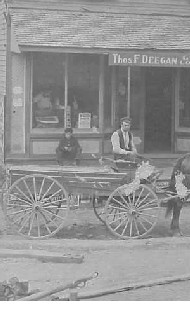| Pages in topic: [1 2 3] > | Do you too find the origins of words fascinating? Thread poster: Sheila Wilson
|
|---|
Sheila Wilson 
Spain
Local time: 18:43
Member (2007)
English
+ ...
I'm principally a teacher (of English in France) and I find the similarities and links between the two languages a constant source of interest, both to me and to my students.
Often my adult students have no idea of the meanings behind the names of products they see in the shops - a good example is pet food - Chum, Pal, Whiskas, Kit-e-kat etc all take on a new meaning for them.
Other words have crossed the Channel (and the Atlantic) in the other direction, such as Mayda... See more I'm principally a teacher (of English in France) and I find the similarities and links between the two languages a constant source of interest, both to me and to my students.
Often my adult students have no idea of the meanings behind the names of products they see in the shops - a good example is pet food - Chum, Pal, Whiskas, Kit-e-kat etc all take on a new meaning for them.
Other words have crossed the Channel (and the Atlantic) in the other direction, such as Mayday (the distress call of course rather than the public holiday) and surrender.
Then there are some that obviously have identical origins although the words are very different: English-speakers break their overnight fast with breakfast, the French with (petit-)déjeuner; we go on a honeymoon, the French on a lune de miel. Does anyone know the origin of this last one? Is it that it was originally a one-month holiday of sweetness? It seems unlikely but there must be some reason (note to non-French speakers: you've probably guessed that lune=moon and miel=honey).
Anyone got anything to add, in any language combination? ▲ Collapse
| | | | | |
According to the Oxford Dictionary of English Etymology:
Honeymoon: first month after marriage XVI (J. Heywood); expl. by early writers with ref. to affection of married people changing with the moon.
I didn't know that. But I also love words and, of course, how they've come to be. Breakfast comes from two words: Break and fast. Pretty self-explanatory. Same as in Spanish: Desayuno (des- = un- [as in undo, uncover]) and -ayuno = fast).
Same in French, but:
déjeuner comes from a verb meaning "to break the fast". In Standard French, however, breakfast is rendered by petit-déjeuner. The change is supposedly due to the practices of Louis XIV, who rose at noon to take his first meal of the day, which he called déjeuner. Since the king's servants still had to get up early, they had a small breakfast, which they called petit déjeuner. The French court soon adopted the changes, spreading the new use of the word déjeuner throughout France, but Belgium, Switzerland, and Canada kept the old terms.
Ref: http://www.nationmaster.com/encyclopedia/Belgian-French
Check out his forum too, you might find it interesting: http://www.wordorigins.org.
[Edited at 2009-01-23 22:58 GMT]
| | | | Juan Jacob 
Mexico
Local time: 11:43
French to Spanish
+ ...
...find the origins of words fascinanting.
Didn't know anything about honeymoon, though:
http://fr.wikipedia.org/wiki/Lune_de_miel
http://en.wikipedia.org/wiki/Honeymoon
(Nothing in Spanish in wikipedia).
What's the origin of Whiskas, BTW?... See more ...find the origins of words fascinanting.
Didn't know anything about honeymoon, though:
http://fr.wikipedia.org/wiki/Lune_de_miel
http://en.wikipedia.org/wiki/Honeymoon
(Nothing in Spanish in wikipedia).
What's the origin of Whiskas, BTW?
Home, we speak French and Mexican Spanish.
It's quite difficult to explain to the little ones that "words come from somewhere and have a meaning"...
-What does "telephone" mean?, I ask.
-C'mon, Dad, it's that stuff to talk to somebody, says Émile, 7. What are you talking about... don't you know that? You should... you're quite old now...
-Yeah, right... but... WHAT DOES IT MEAN?
-What do you mean what doest it mean? Are you OK, Dady?
-I mean, it comes from a language called ancient Greek...
-The what???
-An old language... listen... "tele" means "far", and "fono", sound... get it?
-The what???
-That is, something in wich sounds travels far... got it?
-Yeah, right, the Iphone!
-Yeah... that's it.
As we live in Mexico, a lot of words (specialy village/town names) have nahua origins.
-We're coming trough Coatepec... do you know what it means?, I ask Émile and Valentina, 6.
-Yeah... it's a village!
-Right... but WHAT DOES IT MEAN?
-Are you OK, Dady?
-Listen, that's from coatl, that is, snake, and tepetl, hill... this village name means "The hill with snakes", got it?
-Not true, Dady, don't see snakes anywhere!
-Well, yes, but...
-C'mon, Dad, drive on!
Then, I try to explain them the origin of the word "etymology". Well, somehow, they learn... ▲ Collapse
| | |
|
|
|
Patricia Rosas 
United States
Local time: 10:43
Spanish to English
+ ...
In memoriam
Juan Jacob wrote:
-What does "telephone" mean?, I ask.
-C'mon, Dad, it's that stuff to talk to somebody, says Émile, 7. What are you talking about... don't you know that? You should... you're quite old now...
-Yeah, right... but... WHAT DOES IT MEAN?
-What do you mean what doest it mean? Are you OK, Dady?
-I mean, it comes from a language called ancient Greek...
-The what???
-An old language... listen... "tele" means "far", and "fono", sound... get it?
-The what???
-That is, something in wich sounds travels far... got it?
-Yeah, right, the Iphone!
-Yeah... that's it.
Thank you, Juan Jacob, for making my day! And thanks, Sheila, for starting this interesting thread!
I, too, find the roots of words fascinating, esp. Arabic words that came into English from Spanish spoken here in the American southwest.
I recently had to work with some Nahuatl material, and the town of Coatepec came up (mentioned by Juan Jacob above). I was simply blown away when I discovered it meant Snake Mountain... Not quite sure why, but it curls my toes!
Patricia
| | | | Niraja Nanjundan (X) 
Local time: 23:13
German to English
| Indian words used in English | Jan 24, 2009 |
Thanks, Sheila, for starting this interesting thread.
Here are some words used in English that have their roots in Indian languages:
avatar: In Hinduism an avatar is a manifestation of a God or deity released in a bodily form on earth. In English it is used to express the embodiment of a person or idea.
bandana: a large coloured handkerchief or neckerchief. The word probably came via Portuguese from Hindi into English.
pyjamas: In English th... See more Thanks, Sheila, for starting this interesting thread.
Here are some words used in English that have their roots in Indian languages:
avatar: In Hinduism an avatar is a manifestation of a God or deity released in a bodily form on earth. In English it is used to express the embodiment of a person or idea.
bandana: a large coloured handkerchief or neckerchief. The word probably came via Portuguese from Hindi into English.
pyjamas: In English this means loose trousers and a top used for sleeping in. In Asian countries it just means loose trousers with a drawstring waist. This word has its origins in Urdu and Persian.
jodhpurs: In English these are trousers worn for horse riding. They are named after the Indian city of Jodhpur.
gymkhana: In English, this is an event for horse riding competitions. In India a gymkhana is a public place with sports facilities.
pundit: The Sanskrit word means a learned person. In English it is used for an expert in a particular subject.
Source: Oxford English Dictionary ▲ Collapse
| | | | Juan Jacob 
Mexico
Local time: 11:43
French to Spanish
+ ...
...didn't know...
1.- avatar, in French and Spanish, too.
2.- bandana, in French too.
3.- pyjamas, in French and Spanish, too. In Mexico, slight transformation: Piyama.
Bungalow (from hindi bangla, from Bengal) is another one, used in French and Spanish.
And, as pointed, a lot arabic words into Spanish: aceituna (olive), ojalá (Inch Ala), a lot of words beginning with "al", almohada, alcahuete, alcachofa, alcalde, alacena... and with "guad" (ua... See more ...didn't know...
1.- avatar, in French and Spanish, too.
2.- bandana, in French too.
3.- pyjamas, in French and Spanish, too. In Mexico, slight transformation: Piyama.
Bungalow (from hindi bangla, from Bengal) is another one, used in French and Spanish.
And, as pointed, a lot arabic words into Spanish: aceituna (olive), ojalá (Inch Ala), a lot of words beginning with "al", almohada, alcahuete, alcachofa, alcalde, alacena... and with "guad" (uad, or ued, or wed, river) Guadalquivir, Guadalajara... and probably Guadalupe, Virgen of Mexico. ▲ Collapse
| | | |
How could you forget "calico" (from Calcutta)?
| | |
|
|
|
Niraja Nanjundan (X) 
Local time: 23:13
German to English
| From the OED again | Jan 24, 2009 |
I looked up the meaning and origins of the word "calico." As most of you would know it's a type of cotton cloth, but it doesn't originate from the Indian city of Calcutta. The fabric originated from a former sea port in south-west India called Calicut, hence the name "calico." I think the name of this port has since been changed, though I'm not sure what it's called nowadays.
| | | |
The word sugar in English, I was told, comes from the Hindi/Sanskrit word shakar. There are many such words I am sure.
| | | | Ildiko Laskay 
Hungary
Local time: 19:43
English to Hungarian
+ ...
| the origin of the term 'honeymoon' | Jan 24, 2009 |
As far as I know the term 'honeymoon' originated in Babylon about 4,000 years ago. The bride's father would give the groom all the mead (honey beer) he wanted for a month after the wedding. The Babylonian calendar was a lunar calendar (based on the moon phases). So they started to call that month 'honey month', which is now called honeymoon.
[Módosítva: 2009-01-24 06:40 GMT]
| | | | Sheila Wilson 
Spain
Local time: 18:43
Member (2007)
English
+ ...
TOPIC STARTER | Thanks for your contributions | Jan 24, 2009 |
Lovely to hear some explanations of the origins of honeymoon.
NB To Juan - a cat has whiskers rather than Whiskas, but marketing professionals threw out the dictionaries long ago.
The ones that particularly fascinate me are the words that arrive more or less by accident, or that get changed so much that nobody recognises them. Examples:
In the Netherlands a man's suit jacket is called a 'colbert'. Why? Because Napoleon left Marshal Colbert in charge of the ... See more Lovely to hear some explanations of the origins of honeymoon.
NB To Juan - a cat has whiskers rather than Whiskas, but marketing professionals threw out the dictionaries long ago.
The ones that particularly fascinate me are the words that arrive more or less by accident, or that get changed so much that nobody recognises them. Examples:
In the Netherlands a man's suit jacket is called a 'colbert'. Why? Because Napoleon left Marshal Colbert in charge of the Dutch for a few years, and he wore one!
In France a man's ultra-formal dress jacket is called a 'redingote'. It resembles the formal jacket worn some time ago in England when 'riding to hounds' ie a riding-coat.
Interesting to hear about calico. It seems fabrics often get their names that way - jeans from Gènes (or something like that - Genoa in English, I believe), denim from ('de' in French) Nîmes.
Please, keep 'em coming. ▲ Collapse
| | |
|
|
|
Lia Fail (X) 
Spain
Local time: 19:43
Spanish to English
+ ...
| rebeca = cardigan | Jan 24, 2009 |
In Spanish, "rebeca" is the word for cardigan, and apparently the origin is the film "Rebecca" and the classic twinset cardigan Joan Fontaine wore in the film.
And cardigan itself was named after Lord Cardigan.
[Edited at 2009-01-24 15:35 GMT]
| | | | Jack Doughty 
United Kingdom
Local time: 18:43
Russian to English
+ ...
In memoriam | A politically incorrect word | Jan 24, 2009 |
Local staff working on the Suez Canal were known as Workers On Government Service, and wore overalls with the letters WOGS on the back, which is said to be the origin of this word, now considered to be racially abusive. (Well, that's the story anyway, can't vouch for the truth of it).
| | | | | Ok, I have one... | Jan 24, 2009 |
...But probably most of you know it already: the word OK.
I heard once this story: during American Civil War, there were inspections after the attacks to camps, to count the victims. The soldiers were used to write on the tents the number of killed people, and for the tents where nobody was killed it's said they were writing: 0 K (zero killed).
Anyway, I did a short search now, and it looks like other theories are that "Ok" comes from the Bostonian "Oll Korrect", or fro... See more ...But probably most of you know it already: the word OK.
I heard once this story: during American Civil War, there were inspections after the attacks to camps, to count the victims. The soldiers were used to write on the tents the number of killed people, and for the tents where nobody was killed it's said they were writing: 0 K (zero killed).
Anyway, I did a short search now, and it looks like other theories are that "Ok" comes from the Bostonian "Oll Korrect", or from the American Indian word "Okeh", or from the Greek "Ola Kala".
Do you know anything about that? ▲ Collapse
| | | | | Pages in topic: [1 2 3] > | To report site rules violations or get help, contact a site moderator: You can also contact site staff by submitting a support request » Do you too find the origins of words fascinating? | TM-Town | Manage your TMs and Terms ... and boost your translation business
Are you ready for something fresh in the industry? TM-Town is a unique new site for you -- the freelance translator -- to store, manage and share translation memories (TMs) and glossaries...and potentially meet new clients on the basis of your prior work.
More info » |
| | Trados Business Manager Lite | Create customer quotes and invoices from within Trados Studio
Trados Business Manager Lite helps to simplify and speed up some of the daily tasks, such as invoicing and reporting, associated with running your freelance translation business.
More info » |
|
| | | | X Sign in to your ProZ.com account... | | | | | |












